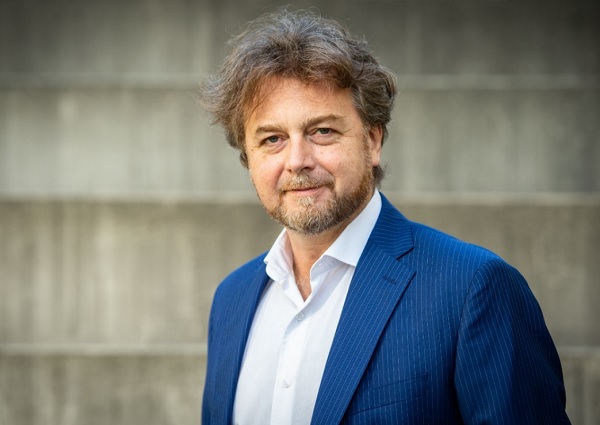The Faculty of Engineering & Natural Sciences is pleased to welcome eleven new professors to the JKU. Today we spoke with Luca Gerardo-Giorda.

Italian mathematician Luca Gerardo-Giorda has been a professor of Mathematical Methods in Medicine and Life Sciences at the JKU since February of 2020. We spoke with him about his contribution to fighting brain tumors and why he considers the JKU a "game-changer".
What is your area of research?
Luca Gerardo-Giorda: I am an applied mathematician and for over 15 years, I have been focusing professionally on biomedical issues. My research lies at the interface of Mathematical Modelling and Numerical Simulation, looking for quantitative answers to real-world problems we face in medicine, biology and physiology. We aim to build bridges between mathematics and other life science disciplines, providing medical doctors with innovative simulation tools to use efficiently in conducting silico pathology assessments and support their clinical decision-making.
What do you find particularly fascinating about this area?
Luca Gerardo-Giorda: The opportunity to provide solutions to real-world problems. The most exciting part is interacting with scientists from different backgrounds. Finding a common language to hold discussions can, in itself, present an additional challenge. It is not as trivial as it sounds but at the same time, it is extremely rewarding.
What are you currently working on?
Luca Gerardo-Giorda: I am working on a series of projects designed to model the cardiovascular system and brain tumor evolution. In this regard, I would like to make reference to the Radiofrequency Ablation study, a common treatment for arrhythmias consisting of applying electrical current to burn specific areas of cardiac tissue. In collaboration with cardiologists, we not only developed a computational model that can be used in assessing efficacy and the safety of current protocols, we also helped design innovative ones. I am also studying the growth, spread and infiltration of glioma, one of the most aggressive types of brain tumors, by combining different spatial and temporal scales in these complex dynamics and to try and predict its evolution in a patient-specific brain reconstructed using medical imaging. Finally, thanks to a grant by the Linz Institute of Technology, we started studying the dynamics of Covid-19 and analyzing Austrian cases by estimating the uncertainty of the actual extent of the epidemic in this country. The model learns from available data and includes mobility data to estimate the amount of interaction between individuals, and is currently being applied to a larger number of countries.
Why is this research even necessary, meaning how will it improve our lives?
Luca Gerardo-Giorda: We help medical doctors and public health officials make more informed decisions. The advantage of advanced virtual models lies in the possibility of simulating a wide range of potential scenarios by simply modifying the model’s parameters. Medical doctors can benefit from effective and reliable, non-invasive and patient-specific instruments designed to improve diagnosis and prognosis. In return, mathematical, numerical and statistical models can provide rigorous tools to conduct quantitative analyses using diagnostic and prognostic content while patient-specific simulations are made possible by integrating these models with data and clinical images.
Why did you choose to come to the JKU?
Luca Gerardo-Giorda: By taking a profile like mine into consideration, the JKU has shown a strong will to invest in interdisciplinary research, something I consider fundamental in order for an institution to be willing to become a game-changer. Mathematics at the JKU and at RICAM (where I have a joint appointment as group leader) is conducted at the highest level, and the young Faculty of Medicine is an ideal environment to conduct cutting-edge research in silico modeling and assessment.
Why should students take your classes?
Luca Gerardo-Giorda: I enjoy teaching and I believe it reflects in my classes. Mathematics is the common language in science and I always try to put mathematics in the perspective of its applications. I consider this approach of paramount importance when teaching students who are majoring in areas such as biology, chemistry or engineering. Mathematics is not a blunt instrument you must learn to use like a black box, but rather the framework in which you can build a model to better understand the physical (or biological) problem you are focusing on.
What are your hobbies?
Luca Gerardo-Giorda: I enjoy music, outdoor hiking, and dancing the tango, although I may be a bit rusty on the latter. I also enjoy food and soccer (after all, I am Italian...).
What else do you want to do or achieve in your life?
Luca Gerardo-Giorda: I still have several projects on my bucket list, but I would like to tackle them one at a time. My current priority is to certainly to understand German better and learn to speak more fluently.








